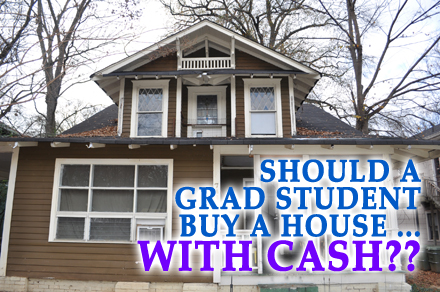 One Afford Anything reader asks:
One Afford Anything reader asks:
In my area, I can buy a quality house/duplex for $45,000 – $100,000.
My partner and I want to get a house with great rentability. We’ll live in it for 4 years while I finish graduate school, at which point we’ll move.
We hope to keep the place – as a rental property — indefinitely.
My question is: Are we better off buying a 100% cash purchase that will give us less rental income? Or are we better off financing a property that is more expensive, and will give us higher rental income?
Sincerely,
Confused with Cash
Here’s my reply:
Dear Confused:
You can’t look at investments in a vacuum. You need to frame the invest within the context of your life.
You’re about to enter a 4-year graduate school program. That means you won’t be earning much income, and you’ll be spending a lot of your time on non-income-producing work.
Given your grad-student status, I’d make an all-cash purchase right now.
After you graduate and you and your partner are both working full-time, you can think about increasing your leverage. But while you’re in school, stick with the option that will free your mental space and maximize your flexibility.
That said, let me add two more points:
#1: Cash Reserves
I don’t know how much money you have set aside for emergencies – such as car repairs, home repairs, and covering your cost-of-living if you can’t find work. I’m assuming that you already have decent reserves built.
Building a cash reserve comes first, before everything else.
If you have to take out a very small mortgage (e.g. plunk down an 80 percent down payment and finance a small piece of the house) for the sake of preserving your emergency fund, go ahead and do it. It’s more important to have a strong emergency fund than it is to be mortgage-free but have $0 in cash reserves.
Why? Let’s say that you’re mortgage-free, but you have zero savings. Suddenly, your heater breaks. In the middle of winter. In Minnesota.
Suddenly, you’re on-the-hook for paying for a very expensive (and urgent) repair. If you don’t have cash reserves, you’ll be forced to charge it on a credit card — with a double-digit interest rate. Yikes!
Feel free to take out a mortgage in order to protect your cash reserves. Think of your mortgage as a “cheap insurance” policy that will protect you from sliding into credit card debt.
Speaking of which …
#2: High-Interest Debt
Since we’re chatting about buying a house in cash, I’m assuming that you don’t have any high-interest debt, such as a credit card. If you have a dime of debt, I’m assuming it’s ultra-low-interest (e.g. lower than a typical mortgage).
If that assumption is wrong … friggin’ pay off your debt. That’s Priority Number One. Build a teeny-tiny cash reserve (about $1,000) and then devote every dime to paying off your high-interest debt.
Assuming you’re debt-free and you have solid cash reserves, shoot for the all-cash rental property purchase. And enjoy grad school!